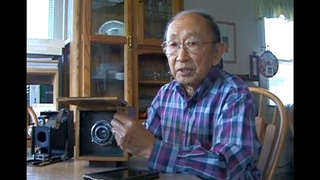Interviews
Role of the redress movement in helping Nisei to open up about their wartime experiences
When redress started, though, in the late '70s, or the idea started gaining momentum, then my parents started talking openly. I think, I mean, they talked very openly, they started talking more and more and more and more. And then when I got involved with Korematsu and the coram nobis cases with Hirabayashi and Yasui, too, my parents just would, you couldn't stop 'em after that. [Laughs]
I think they felt vindicated. At one point they felt, they realized—like a lotta Japanese Americans that I have talked to—once redress was either passed, not even passed, but when the movement went forward and they got used to the idea that, “Yeah, we were victims,” I saw a total loosening of the voices of Japanese Americans. They were able to speak again about the camps, and not in a—in a very, very strong way about how they felt. They were being, opened up about their feelings. They felt free to talk about one of the terrible things, some of the terrible things that happened to them.
Date: February 8, 2003
Location: Washington, US
Interviewer: Tom Ikeda, Margaret Chon
Contributed by: Denshō: The Japanese American Legacy Project.
Explore More Videos

Life in camp as teenager
(1926 - 2012) Scholar and professor of anthropology. Leader in the establishment of ethnic studies as an academic discipline

Didn't have rights that whites had
(1922–2014) Political and civil rights activist.

Californians didn't know about evacuation
(1922–2014) Political and civil rights activist.

Conditions of assembly centers
(1922–2014) Political and civil rights activist.

Visit to assembly centers by E. Stanley Jones
(1922–2014) Political and civil rights activist.

Hiding what happened in camp
(1922–2014) Political and civil rights activist.



Camp as a positive thing
(1922–2014) Political and civil rights activist.

His father describes the importance of photographing camp life
(1924-2016) Photographer and businessman.

Involvement in JACL
(b.1935) American born Japanese. Retired businessman.

Importance of education in achieving redress for incarceration
(1919-2014) Activist for civil rights and redress for World War II incarceration of Japanese Americans.

Finding work in the assembly center
(b.1913) Kibei from California who served in the MIS with Merrill’s Marauders during WWII.

Train ride to Jerome Relocation Center
(b.1913) Kibei from California who served in the MIS with Merrill’s Marauders during WWII.

Evacuation
(b.1909) Nisei from Washington. Incarcerated at Tule Lake and Minidoka during WWII. Resettled in Chicago after WWII
